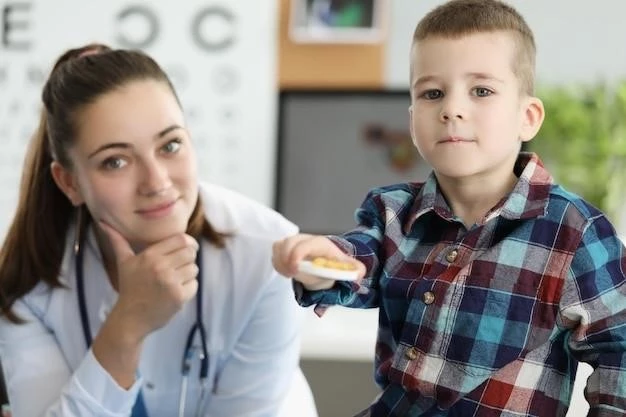Symptoms of Chromosome 7 Trisomy 7p
Common indicators⁚ Growth delays, developmental delays, intellectual disabilities.
Physical attributes⁚ Distinct facial features, hearing loss, heart defects.
Other symptoms⁚ Cognitive impairment, speech delays, and motor skill challenges.
Overview of Trisomy 7p Symptoms
Trisomy 7p symptoms typically manifest as growth delays, developmental delays, and intellectual disabilities. Individuals may exhibit distinct facial features, hearing loss, and heart defects. Cognitive impairment, speech delays, and motor skill challenges are also common in those with this condition.
Medical Complications Related to Trisomy 7p
Individuals with Trisomy 7p may experience various medical complications such as heart defects, hearing loss, and respiratory issues. Gastrointestinal abnormalities, kidney problems, and immune system deficiencies are also potential challenges associated with this condition. It is essential for healthcare providers to monitor and manage these complications effectively.
Causes of Trisomy 7p
Genetic anomaly⁚ Trisomy 7p arises from an extra partial copy of chromosome 7, leading to genetic abnormalities. This condition typically occurs sporadically and is not inherited from parents.
Genetic Origins of Chromosome 7 Trisomy 7p
Chromosome 7 Trisomy 7p originates from an error during cell division٫ resulting in an extra partial copy of chromosome 7. This genetic anomaly leads to the characteristic features and health complications associated with the condition. It is considered a sporadic occurrence with no specific inheritance pattern.
Risk Factors for Trisomy 7p
Trisomy 7p is primarily a result of random errors in the formation of reproductive cells or during early fetal development. Advanced maternal age is a known risk factor for chromosomal abnormalities, including Trisomy 7p. However, most cases occur sporadically without a clear predisposing factor.
Diagnosis and Testing for Chromosome 7 Trisomy 7p
Genetic tests⁚ Karyotyping, chromosomal microarray analysis, and fluorescence in situ hybridization (FISH).
Prenatal screenings⁚ Nuchal translucency ultrasound, maternal serum screening, and amniocentesis.
Clinical evaluations⁚ Physical exams, developmental assessments, and specialized testing.
Diagnostic Procedures for Trisomy 7p
Diagnostic procedures for Trisomy 7p include genetic tests like karyotyping, chromosomal microarray analysis, and FISH to identify chromosomal abnormalities. Prenatal screenings such as nuchal translucency ultrasound and amniocentesis can detect genetic anomalies in the fetus. Clinical evaluations encompass physical exams, developmental assessments, and specialized testing to confirm the diagnosis.
Genetic Counseling and Family Planning
Genetic counseling is crucial for families affected by Trisomy 7p. Counselors provide information on the condition, recurrence risks, and available family planning options. Discussions may involve topics such as prenatal testing, assisted reproductive technologies, and emotional support. Empowering families with knowledge can aid in making informed decisions regarding future pregnancies.
Treatment Options for Trisomy 7p
Individualized care⁚ Addressing developmental, medical, and supportive needs based on the specific challenges presented.
Early interventions⁚ Therapies focusing on speech, physical, and occupational development to enhance quality of life.
Medical management⁚ Monitoring and managing associated medical issues to optimize health outcomes.
Medical Interventions for Chromosome 7 Trisomy 7p
Medical interventions for Chromosome 7 Trisomy 7p focus on managing associated health issues. Treatments may include cardiac surgeries for heart defects, hearing aids for hearing loss, and therapies for developmental delays. A multidisciplinary approach involving specialists such as pediatricians, geneticists, and therapists is key to providing comprehensive care and enhancing the individual’s wellbeing.
Multidisciplinary Care Team Support
Individuals with Chromosome 7 Trisomy 7p benefit from a multidisciplinary care team comprising pediatricians, geneticists, therapists, and specialists. This collaborative approach ensures comprehensive care addressing medical, developmental, and emotional needs. The team works together to tailor treatment plans, provide therapies, and offer support to enhance the individual’s quality of life and overall well-being.
Prognosis and Life Expectancy with Trisomy 7p
Varies by individual⁚ Prognosis depends on the severity of symptoms and the effectiveness of treatments.
Enhanced care⁚ Improved medical management and early interventions can positively impact outcomes.
Lifespan considerations⁚ Life expectancy may vary, and ongoing supportive care is essential.
Long-Term Outlook for Individuals with Trisomy 7p
The long-term outlook for individuals with Trisomy 7p is influenced by the management of associated conditions and the level of support received. With early interventions, specialized therapies, and comprehensive care, individuals can achieve optimal developmental milestones and quality of life. Monitoring health, addressing needs, and accessing appropriate resources play key roles in enhancing long-term outcomes and well-being.
Quality of Life Factors
Factors influencing the quality of life for individuals with Trisomy 7p include access to healthcare, early interventions, social support, educational resources, and developmental therapies. Maximizing independence, fostering social connections, and providing a nurturing environment are vital aspects in enhancing the overall well-being and quality of life for individuals affected by Trisomy 7p.
Research and Advances in Chromosome 7 Trisomy 7p
Exploring new⁚ Genetic technologies, therapeutic approaches, and support strategies for improved outcomes.
Future potential⁚ Advancements in understanding the condition and enhancing quality of life for affected individuals.
Current Research Initiatives
Ongoing research on Chromosome 7 Trisomy 7p focuses on identifying new treatment modalities, understanding the molecular mechanisms underlying the condition, and developing personalized care plans. Studies aim to enhance diagnostic tools, improve therapeutic interventions, and expand support services for individuals and families. Collaborative efforts among researchers worldwide contribute to advancing knowledge and enhancing outcomes for those affected by Trisomy 7p.
Future Directions in Trisomy 7p Research
Future research on Trisomy 7p aims to explore gene therapies٫ precision medicine approaches٫ and novel interventions to address the specific challenges associated with the condition. Studies will focus on enhancing early diagnosis٫ refining treatment strategies٫ and promoting long-term health and well-being for individuals with Trisomy 7p. Collaborative research endeavors seek to pave the way for improved outcomes and quality of life for affected individuals and families.
Support and Resources for Individuals with Trisomy 7p
Comprehensive⁚ Access to specialized medical care, developmental therapies, and support organizations for enhanced well-being.
Community⁚ Engagement with advocacy groups and community services offering guidance and assistance for individuals and families.
Patient Advocacy Organizations
Patient advocacy organizations play a vital role in supporting individuals with Trisomy 7p and their families by providing information, resources, and emotional support. These organizations advocate for awareness, access to healthcare, and research funding. They create a supportive community that empowers individuals and families to navigate the challenges associated with Trisomy 7p and access necessary support services.
Community Services and Assistance Programs
Community services and assistance programs offer valuable support to individuals with Trisomy 7p and their families. These programs provide access to early intervention services, educational resources, respite care, and financial assistance. They collaborate with healthcare providers and advocacy groups to ensure a holistic approach to care and support, enhancing the well-being and quality of life for those affected by Trisomy 7p.

Coping Strategies for Families Affected by Trisomy 7p
Education⁚ Learn about the condition, connect with support groups, and access mental health resources.
Communication⁚ Open dialogue, seek guidance from healthcare professionals, and prioritize self-care.
Emotional Support and Mental Health Resources
Emotional support and mental health resources are essential for families affected by Trisomy 7p. Counseling services٫ support groups٫ and therapy sessions can help family members cope with the emotional challenges and stressors. Access to mental health professionals and community resources can provide valuable support٫ guidance٫ and strategies for maintaining well-being and resilience in the face of adversity.
Educational and Developmental Support
Educational and developmental support services play a crucial role in empowering individuals with Trisomy 7p. Specialized education programs, individualized learning plans, and early intervention therapies assist in promoting cognitive, social, and motor skill development. Collaborating with educators, therapists, and specialists ensures tailored support to foster growth, independence, and overall well-being for individuals with Trisomy 7p.
